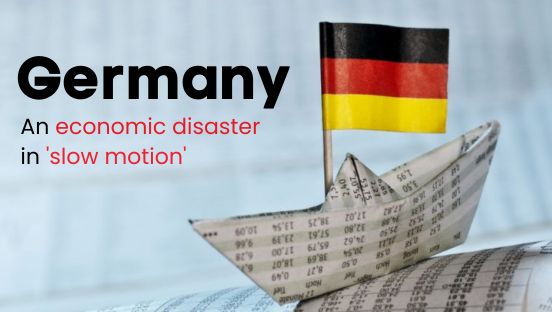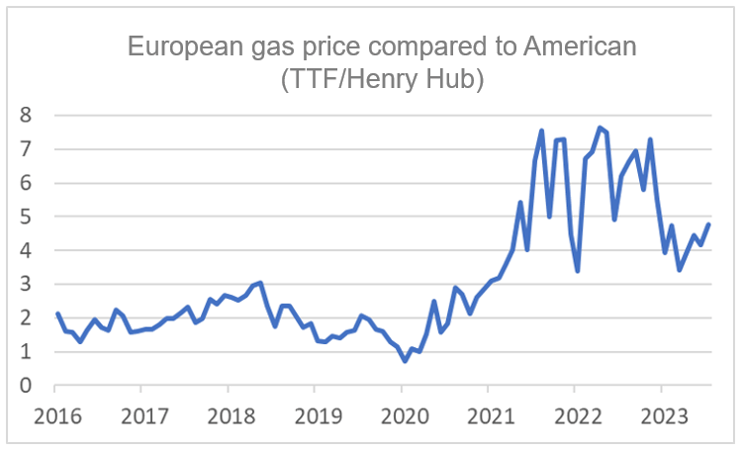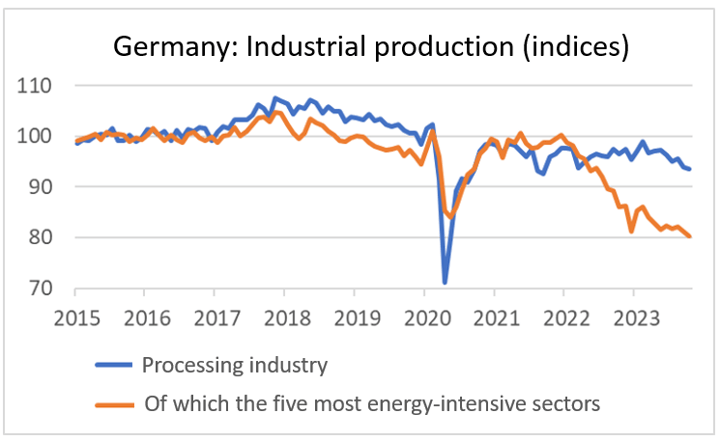
- Germany faces an economic disaster with declining energy-intensive industries.
- High energy prices make German sectors globally uncompetitive.
- Key industries have dropped 25% since 2017, risking GDP and jobs.
- Indifference to this decline threatens overall prosperity.
Google Translated from Dutch to English. Here is the link to the original article in Dutch. The article was originally published on 13 December 2023.
An economic disaster is unfolding in slow motion in Germany. However, not much attention is paid to it. It typifies the mood in Europe. Everyone gets excited about anything and everything. But no one is interested in the basis of our prosperity anymore. Okay, maybe I'm charging. That's because I get so worked up about it.
Compared to other European economies, the German one is characterised by a relatively large industrial sector (approximately 20% of GDP). This is the basis of German prosperity on which we benefit.
Chemicals and other energy-intensive sectors play an important role in German industry. Destatis, the German CBS, reports monthly on developments in the five most energy-intensive sectors. These account for 77% of the combined energy consumption in industry or 22% of the total energy consumption in Germany. They thus generate 17% of the industry's added value as a whole, or approximately 3.5% of German GDP.
Naturally, these five sectors, like all of us, struggle with high energy prices. For an internationally competitive, energy-intensive sector, not only the absolute level of energy prices is important, but also how they compare with elsewhere in the world.
Before the pandemic, the gas price in Europe was generally slightly higher than that in the US, but never before has our price been structurally five times higher than there, which is the case now. Bear in mind that energy costs are currently significantly higher than before the pandemic because prices are significantly higher in absolute terms. This comparison does not even take into account taxes on energy, which are higher in Europe, or the ETS price (Emission Trading System) for CO2 emissions in Europe.
 Source: Macrobond
Source: Macrobond
Electricity prices are also higher in Germany than elsewhere. German companies pay approximately six times as much for electricity as American producers and ten times as much as companies in China.
No wonder that production in Germany's energy-intensive industry is under pressure. You can, of course, say that we want to reduce energy consumption and that we would therefore rather get rid of sectors that consume so much energy than be rich, but that does not benefit the world as a whole. After all, we do need the products of these industries. If production moves to other countries, there is a good chance that it will emit even more CO2 there.
The disaster that is unfolding is that production in the five energy-intensive sectors in Germany continues to decline. This is now about 25% lower than at the end of 2017. What may also play a role is the uncertainty about future regulations, the (un)certainty of energy supply, and taxes. The European ambition to be far ahead in the energy transition certainly does not help.
 Source: Destatis
Source: Destatis
Why is that a disaster, you may wonder? That's simple. As reported, these five sectors generate around 3.5% of Germany's GDP. They do this with only 2% of total employment. In other words, the added value created by an employed person in these sectors is 75% higher than that of the average employee. This concerns almost a million jobs. What escapes most people is that the surplus added value generated in these sectors by the economic process ultimately promotes the prosperity of everyone. That is why I find the indifference towards the demise of this activity incomprehensible. The sad thing is that in retrospect the cause of the disappointing development of prosperity will remain unclear to most.
The Germans themselves are also partly to blame for the loss of their beautiful energy-intensive industry with their failed 'Energiewende'. What is happening here is no less than an economic hara-kiri.



